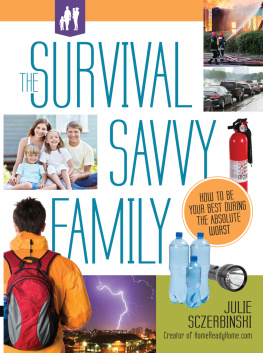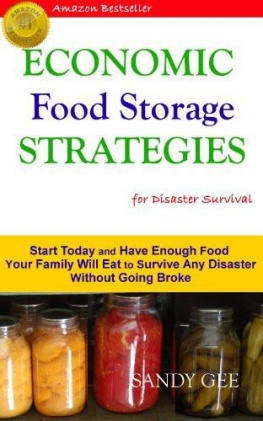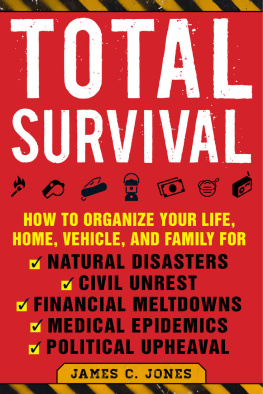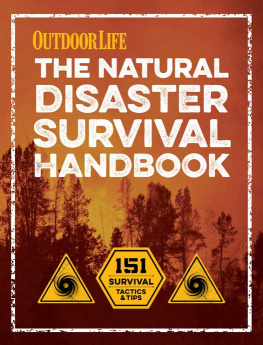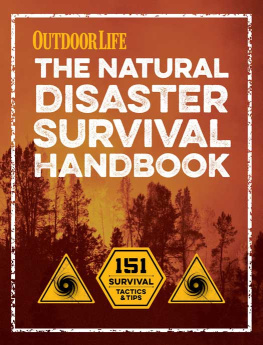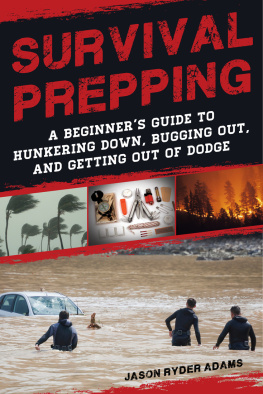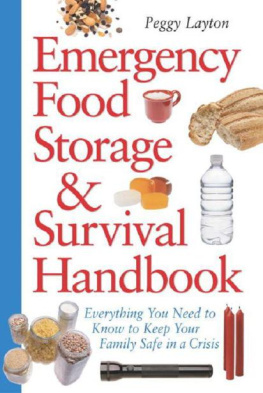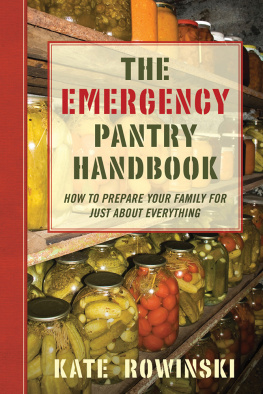Contents
Guide
THE SURVIVAL
SAVVY
FAMILY
JULIE SCZERBINSKI
Creator of HomeReadyHome.com
DEDICATION
To Pete, Sophie, and Mia
CONTENTS
Introduction
If my family had to evacuate, where would we go?
How would we have managed if our tap water was contaminated?
What would I have fed the kids if we were stuck on the Atlanta interstate for ten hours like thousands were during a winter storm?
What exactly goes in an emergency kit?
I know I am not alone in my concerns. One or two of these questions have crossed your mind. Have you also had moments when you wondered what you should do if a disaster strikes while your kids are at school or worried about the possibility of a stranger luring your child into his car?
Good news. Asking these kinds of questions will bring you closer to being survival savvy. In other words, ready for whatever emergency comes your way.
Survival savvy is having a plan. Its thinking about the tough situations that no one likes to think about and then coming up with a strategy for tackling them. There are huge benefits to having a plan and living ready. Knowing what to do and how to do it reduces the danger your family faces in a disaster. Not to mention the fear and anxiety. If you have a plan, things become easier in a challenging situation.
Id like to be able to say Ive always been ready but that isnt the case. Growing up, I lived a pretty carefree life. Any plans I made revolved around school, work and friends. After college, the only thing I was ready for was marriage and a family.
Not long after my husband and I married, 9/11 happened. Like millions of Americans, I was shaken to the core. It was the first time I actually thought what if. Then, our town officials handed out potassium iodine pills, a.k.a. nuke pills. Convinced the authorities knew something they werent telling me, I did the only thing I could think of to prepare my family for the worst-case scenario. I threw together an emergency kit.
When the worst never happened, I put off updating the emergency kit. I had plenty of excuses why I never got around to it. My philosophy? It wont happen to us. Besides, I like to think positive. And as a mom with two kids I was far too busy to focus on another thing.
I didnt give readiness any more thought for a few years. The tipping point came when I read Chris Martensons book, The Crash Course. In it, Martenson examines the sustainability of our economy, energy and environment and sums up his findings in this sentence: Massive change is upon us.
Thinking about a changing world brought back the what ifs. And this time my questions didnt seem so far-fetched. After all, look at hurricanes Katrina and Sandy, the tsunamis in Thailand and Japan, the earthquake in Haiti, and the tornado in Joplin, Missouri. Those were just some of the big, newsworthy events. At the same time, I was hearing of many challenging personal situationsfriends who had lost their jobs, homes and spouses. Amid all this uncertainty, the only thing I could be certain of was planning for an emergency is a wise idea.

Id like to be able to say Ive always been ready but that isnt the case. Growing up, I lived a pretty carefree life. Any plans I made revolved around school, work, and friends. After college, the only thing I was ready for was marriage and a family.
I no longer think it wont happen to my family. Yes, most of the disasters are low probability events. But all of them are high impact events. Are you willing to gamble with your loved ones well-being? Im not. Taking the steps to plan and be ready is the responsible thing to do. As parents, we have little lives depending on us to care for and keep them safe. You dont want to be caught in a crisis with your children, thinking if only I had planned for this.
Im still a positive thinker. Being ready doesnt change that. Making a plan for negative events doesnt mean you are attracting them into your life. Buying car insurance and wearing your seat belt doesnt guarantee you a car accident, does it?
And Ive discovered planning for a disaster doesnt take as much time as I originally thought. Once your plans are in place, the time commitment is minimal. A few minutes, a few times a year to review plans, practice and rotate supplies. In between, its business as usual. It really is easy, but you have to be vigilant. Pay attention to whats going on around you and whats happening in the news.
I know it all can seem overwhelming at first. Fear not. Im here to help you start. The first two chapters will show you how to make a family emergency plan and what to include in an emergency kit. Next, youll find tips on food and water storage, first aid, and financial planning. Well go over how to be ready when you are on the go, at the office or on vacation. Then Ill cover how to plan for power outages, natural disasters, house fires, and home invasions. Throughout well discuss ways to help your kids be ready, including how to be sure they stay safe at school, in the neighborhood, and online. By the end of the book you will be well on your way to becoming survival savvy.
Sound good? Now turn the page and lets get started.
CHAPTER 1
Family Emergency Plan
Is your familys emergency plan a disaster? If so, youre not alone. Sixty percent of Americans say being ready for emergencies is very important, but less than 20% of us really are ready. Unfortunately, knowing you should be ready wont offer your family the same protection as actually taking the steps to be ready. Whats the first step? Make a plan before disaster strikes.
Lets imagine for a moment the kids are at school and your spouse is at work. Youre just about to run to the store to pick up a few things for dinner when you hear a knock at the front door. A policeman stands on your front step and he says theres been an accident not too far from your neighborhood. A train carrying crude oil derailed and exploded. Hazardous smoke is heading your way and you must leave immediately. Imagine how panicked youd feel because you have no idea what to do! Having an emergency plan will help you stay calm under pressure and take the necessary action to keep you and your family safe.
What Should You Plan For?
Before you can create a plan you have to figure out what you need to plan for. Start by making a list of all the potential emergencies that could affect your family. Think about personal disasters, such as losing your job. Then think about disasters that would impact your neighborhood or town, like a chemical spill or a hurricane. If youre struggling to identify the possibilities, ask your local emergency management office to give you some ideas of the risks for your area. You may feel a little paranoid planning for every disaster imaginable, but wouldnt you rather have a plan for something that never happens than be caught off guard without one?
Making Your Plan
Schedule a family meeting to gather everyone together. With my familys busy schedule, finding 20 minutes where we were together in the same room seemed almost impossible. If you have the same challenge, schedule several mini-meetings. It can be a formal have-a-seat-at-the-dining- room-table gathering or an informal lets-go-grab-some-ice-cream meeting. Either way, try to make it fun. A plan is just another family conversation. It doesnt have to be complicated or boring.

